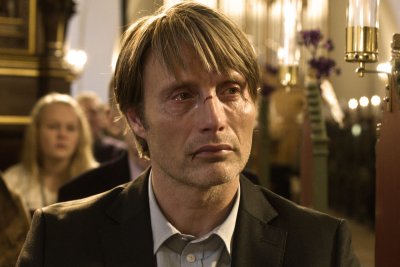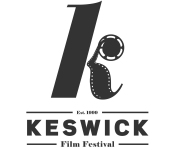Reviews - The Hunt
The Hunt
Reviewed By John Stakes

The Hunt
"It gets into your soul" was Lord McAlpine's answer to the question as to how it feels to be falsely accused of paedophilia. In last Sunday's Scandinavian masterpiece "The Hunt" from Festen (1998) Director Thomas Vinterberg, kindergarten teacher Lucas has to live with the same feeling.
Lucas is mild-mannered, respected, bespectacled, divorced, of low self esteem and living alone. Initially he is able to begin rebuilding his life and succeeds in improving contact with his son and finding a new love interest. His best friend Theo is the father of two children, a teenage boy whom Lucas taught in a primary school before it closed, and five years old Klara whom Lucas knows well. Lucas, popular amongst his nursery pupils, finds himself having to issue a mild rebuke to Klara who has kissed him on the lips when realising he has not “died” in a bit of horseplay with the other children. Klara sulks then tells the nursery Head Grethe that Lucas has exposed himself to her, an accusation triggered by Klara having earlier and fleetingly been shown a pornographic photo by her elder brother.
This sets off a chain reaction which leads to the ostracism of Lucas and the rapid collapse of civilised behaviour amongst the local population as the rumour of his alleged abuse threads and spreads its destructive path. Grethe, out of her depth, calls in a child expert. Together they interview Klara and break every rule of every training manual, failing even to notify let alone bring in Klara's mother Agnes before questioning her daughter in private.
With the benefit of hindsight many might ask why the word of an infant should be taken as gospel and not even considered as ambiguous let alone untrue. Klara, realising she is in the wrong, but not old enough to appreciate the ramifications of her actions, is quick to confess her untruth but no-one believes her. Klara's confusion causes her to say she cannot remember what happened but her elders interpret this to mean she is trying to blot out her dreadful experience. Anxious also no doubt to expunge the stigma and stain of having this problem within their midst many of the locals quickly adopt the mentality of the mob.
"The community disintegrates faster than a badly constructed Ikea cabinet" as one critic put it. The friendship between Theo and Lucas quickly counts for nothing and Lucas and his family are excluded from the local supermarket as the villagers lose their moral compass. Lucas's release by the local magistrate for lack of credible evidence serves merely to fuel their hostility and the vigilantes turn violent.
The director, in focusing on child abuse, is to some extent revisiting territory explored in his 1998 "Festen", where a father was sexually abusing his own children, but whereas in that film the emphasis was on the perpetrator's attempt at concealment of the abuse from the outside world, here it is concerned with how someone falsely accused of abuse deals with the problem whilst caught within a vigilante community.
Not unreasonably Lucas thought Theo and the rest of his community would support him, and was shocked to realise that he had been alienated. Mikkelsen's high cheek-boned gaunt and haunted presence conveyed all we needed to know about Lucas’s torment, visually fleshing out the sparse dialogue. Lucas decides to go on the offensive, to present himself as a mirror to reflect the villagers’ woeful lack of moral and social cohesion and to establish his innocence. Impressive acting from the man who was Bond's blood-teared nemesis in "Casino Royale" and the object of female desire in "The Royal Affair".
At the film's dramatic conclusion when Lucas returns after a year's absence to celebrate his son's coming of age, any thoughts which Lucas may have had that the past had been forgotten and that he had been welcomed back by all into his deer hunting community are dashed when an unidentified person fires a warning reminder shot: the second time in the film that silence is shattered to jolting effect.
Vinterberg, now 43, was a pioneer in the avant-garde Danish "Dogme" film-making movement begun in 1995 and identified by its reliance on hand held cameras, pared down dialogue, lack of any lavish sets, special effects, or music. This was an approach to film-making which not merely encouraged emerging talent but invested the film style with clarity and accessibility.
In the intervening years Vinterberg has gradually become more main-stream but without sacrificing his roots, and here the stripped down dogme style accentuates Lucas’s plight by focusing directly on it and subordinating all other aspects. The only music we hear is the pluck of occasional sombre guitar strings which perfectly captures the film’s mood. To maintain the film’s intensity and tension Vinterberg's camera tracks Lucas (down) wherever he ventures forth. His use of silence is masterly. Whilst the central theme is distressing, the Director avoids the temptation to sermonise by lacing his film with gallows humour at key moments, for example when Lucas is released from police custody into the home of his son’s godfather.
It would have been just as engrossing perhaps had Vinterberg opted to present Lucas as a more ambiguous character with the question of his guilt or innocence never being answered. But by removing any circumspection from the start Vinterberg was able to arouse and instil into his audience a sense of moral outrage at Lucas's undeserved victimisation, which gained in intensity as the film progressed.
"The Hunt" premiered at Cannes 2012 and Mikkelsen deservedly won its Best Actor award. The film was also Bafta nominated as was Vinterberg for the Palme D'Or. Keswick voted it amongst the best of the year to date.
Next Sunday we go back in time for the club’s screening of the US 2012 indie time machine in garage gem "Safety Not Guaranteed" directed by Colin Trevorrow. "Consistently laugh out loud funny" as one critic described it: not an experience often found in Scandinavian cinemas these days, but, in the Alhambra Keswick, a welcome antidote nonetheless to its dark side.
Lucas is mild-mannered, respected, bespectacled, divorced, of low self esteem and living alone. Initially he is able to begin rebuilding his life and succeeds in improving contact with his son and finding a new love interest. His best friend Theo is the father of two children, a teenage boy whom Lucas taught in a primary school before it closed, and five years old Klara whom Lucas knows well. Lucas, popular amongst his nursery pupils, finds himself having to issue a mild rebuke to Klara who has kissed him on the lips when realising he has not “died” in a bit of horseplay with the other children. Klara sulks then tells the nursery Head Grethe that Lucas has exposed himself to her, an accusation triggered by Klara having earlier and fleetingly been shown a pornographic photo by her elder brother.
This sets off a chain reaction which leads to the ostracism of Lucas and the rapid collapse of civilised behaviour amongst the local population as the rumour of his alleged abuse threads and spreads its destructive path. Grethe, out of her depth, calls in a child expert. Together they interview Klara and break every rule of every training manual, failing even to notify let alone bring in Klara's mother Agnes before questioning her daughter in private.
With the benefit of hindsight many might ask why the word of an infant should be taken as gospel and not even considered as ambiguous let alone untrue. Klara, realising she is in the wrong, but not old enough to appreciate the ramifications of her actions, is quick to confess her untruth but no-one believes her. Klara's confusion causes her to say she cannot remember what happened but her elders interpret this to mean she is trying to blot out her dreadful experience. Anxious also no doubt to expunge the stigma and stain of having this problem within their midst many of the locals quickly adopt the mentality of the mob.
"The community disintegrates faster than a badly constructed Ikea cabinet" as one critic put it. The friendship between Theo and Lucas quickly counts for nothing and Lucas and his family are excluded from the local supermarket as the villagers lose their moral compass. Lucas's release by the local magistrate for lack of credible evidence serves merely to fuel their hostility and the vigilantes turn violent.
The director, in focusing on child abuse, is to some extent revisiting territory explored in his 1998 "Festen", where a father was sexually abusing his own children, but whereas in that film the emphasis was on the perpetrator's attempt at concealment of the abuse from the outside world, here it is concerned with how someone falsely accused of abuse deals with the problem whilst caught within a vigilante community.
Not unreasonably Lucas thought Theo and the rest of his community would support him, and was shocked to realise that he had been alienated. Mikkelsen's high cheek-boned gaunt and haunted presence conveyed all we needed to know about Lucas’s torment, visually fleshing out the sparse dialogue. Lucas decides to go on the offensive, to present himself as a mirror to reflect the villagers’ woeful lack of moral and social cohesion and to establish his innocence. Impressive acting from the man who was Bond's blood-teared nemesis in "Casino Royale" and the object of female desire in "The Royal Affair".
At the film's dramatic conclusion when Lucas returns after a year's absence to celebrate his son's coming of age, any thoughts which Lucas may have had that the past had been forgotten and that he had been welcomed back by all into his deer hunting community are dashed when an unidentified person fires a warning reminder shot: the second time in the film that silence is shattered to jolting effect.
Vinterberg, now 43, was a pioneer in the avant-garde Danish "Dogme" film-making movement begun in 1995 and identified by its reliance on hand held cameras, pared down dialogue, lack of any lavish sets, special effects, or music. This was an approach to film-making which not merely encouraged emerging talent but invested the film style with clarity and accessibility.
In the intervening years Vinterberg has gradually become more main-stream but without sacrificing his roots, and here the stripped down dogme style accentuates Lucas’s plight by focusing directly on it and subordinating all other aspects. The only music we hear is the pluck of occasional sombre guitar strings which perfectly captures the film’s mood. To maintain the film’s intensity and tension Vinterberg's camera tracks Lucas (down) wherever he ventures forth. His use of silence is masterly. Whilst the central theme is distressing, the Director avoids the temptation to sermonise by lacing his film with gallows humour at key moments, for example when Lucas is released from police custody into the home of his son’s godfather.
It would have been just as engrossing perhaps had Vinterberg opted to present Lucas as a more ambiguous character with the question of his guilt or innocence never being answered. But by removing any circumspection from the start Vinterberg was able to arouse and instil into his audience a sense of moral outrage at Lucas's undeserved victimisation, which gained in intensity as the film progressed.
"The Hunt" premiered at Cannes 2012 and Mikkelsen deservedly won its Best Actor award. The film was also Bafta nominated as was Vinterberg for the Palme D'Or. Keswick voted it amongst the best of the year to date.
Next Sunday we go back in time for the club’s screening of the US 2012 indie time machine in garage gem "Safety Not Guaranteed" directed by Colin Trevorrow. "Consistently laugh out loud funny" as one critic described it: not an experience often found in Scandinavian cinemas these days, but, in the Alhambra Keswick, a welcome antidote nonetheless to its dark side.
Find A Film
Search over 1500 films in the Keswick Film Club archive.
Friends
KFC is friends with Caldbeck Area Film Society and Brampton Film Club and members share benefits across all organisations
Awards
Keswick Film Club won the Best New Film Society at the British Federation Of Film Societies awards in 2000.
Since then, the club has won Film Society Of The Year and awards for Best Programme four times and Best Website twice.
We have also received numerous Distinctions and Commendations in categories including marketing, programming and website.
 Talking Pictures
The KFC Newsletter
Talking Pictures
The KFC Newsletter
Links Explore the internet with Keswick Film Club


